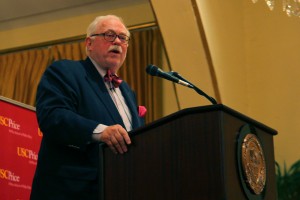Talk on Washington sparks dialogue
The Price School of Public Policy, in connection with the Mount Vernon Association, hosted the first of its Borthwick Lecture Series on Tuesday.

Cherry Tree · USC professor Kevin Starr spoke at an event discussing George Washinton’s connection with the Western frontier. – Min Haeng Cho | Daily Trojan
The discussion on George Washington was sponsored by alumna Maribeth Borthwick, a vice regent for the Mount Vernon Association. USC Professor Kevin Starr spoke on how the West sculpted young Washington and how Washington sculpted the west.
The Mount Vernon Association, whose relationship with USC began last October, aims to preserve Washington’s home in Mount Vernon. It has established a library dedicated to Washington and his upbringing, time in the military and presidency. This collaboration came about through the work of Professor David Sloane, also of the Price School, and Douglas Bradburn, professor at Binghamton University and director of the new library.
Bradburn introduced the lecture with a vibrant sense of humor, joking about his alma mater, which shares the Trojan as a mascot. His passion for the Mount Vernon Association and their evolving mission was evident.
“The Mount Vernon Lady’s Association, at a time when women couldn’t even vote, created a national organization to raise the money to buy [Mount Vernon] and save it. In the last decade they added to that mission and education plank,” Bradburn said. “This new presidential library is part of that new educational mission. The house is transforming from a historic home to a unique educational institution.”
Bradburn sees this presence in the West as a necessary part of the national scope of Mount Vernon. Due to USC’s continual rise to intellectual prominence, this partnership seemed inevitable, Bradburn said.
Sloane sees the event as beneficial for West Coast students, who live far from, as he calls it, “that place of first democracy,” Washington D.C. He also, however, sees something important for students from the East Coast.
“[East Coast students] get to hear Kevin talk about how Washington thought about opportunities of America through the lens of the West,” Sloane said. “One of the reasons they came to USC is similar to the reason that Washington became a teenager surveying the West. He was looking for opportunities just like they are looking for opportunities.”
Starr’s lecture focused on how these westward opportunities shaped Washington while he was a surveyor and militiaman.
“My sense of Washington comes from the standard biographies, and of course the 152 page of published correspondence, which I recommend you all read; it’ll bring out a new Washington to you, Washington the writer,” Starr said. “All of us readily acknowledge the intellect of the other founding fathers and mothers. But we sometimes overlook this imaginative and intellectual side of George Washington because he did not attend Harvard or Yale but learned based on his own readings.”
Starr argued that Washington’s higher education was in fact the Western Frontier of the colonies, present-day Ohio. He proposed that Washington developed his imagination and intellect from his time on that border.
He suggested that Washington’s relation to the West echoes even today, with the Northwest Ordinance of 1784 imbued with his populist opinions on expansion. Starr even noted that Washington was a fine dancer with good taste in architecture thanks to his relation to both Europe and the Western Frontier.
Though no westward expansion happens today, Bradburn believes the frontier still lives on in the modern-day spirit of innovation, and Sloane connects the West’s association with freedom with modern day California.
Ultimately, Bradburn believed the Borthwick Series, the Price School and the Mount Vernon Association represent what this generation needs.
“One of the things we want to emphasize is to try and convince people to chose public service, to take up the challenge of trying to serve the public good,” Bradburn said. “[Washington’s] story is a great way to understand what that could mean. I think that your generation, which is close to my generation, there’s a real desire for a call to action, to be pushed, to say you can be great and can make the world a better place.”
More Borthwick lectures are to follow as this partnership grows. The lecture in full will be posted to the Price School’s YouTube Channel.
